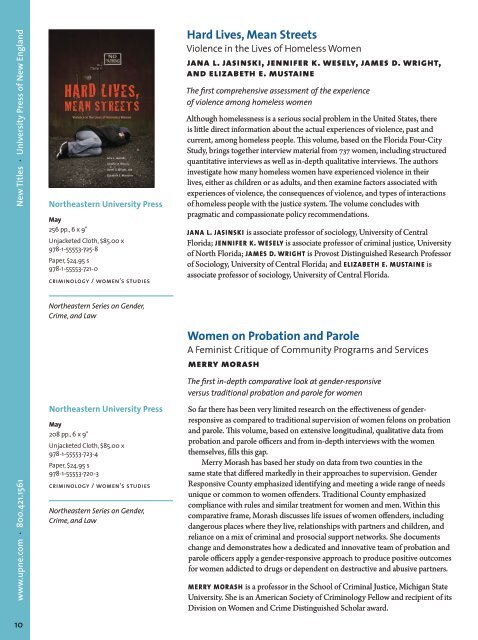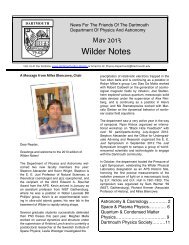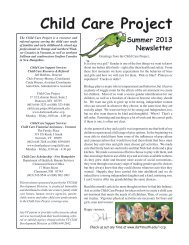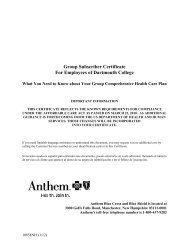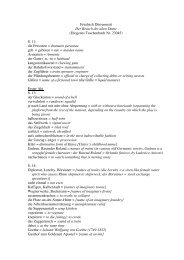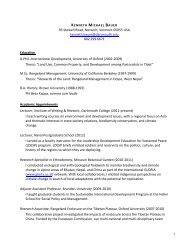University Press of New England - Dartmouth College
University Press of New England - Dartmouth College
University Press of New England - Dartmouth College
Create successful ePaper yourself
Turn your PDF publications into a flip-book with our unique Google optimized e-Paper software.
www.upne.com · 800.421.1561 <strong>New</strong> Titles · <strong>University</strong> <strong>Press</strong> <strong>of</strong> <strong>New</strong> <strong>England</strong><br />
10<br />
HARD LIVES,<br />
MEAN STREETS<br />
Violence in the Lives <strong>of</strong> Homeless Women<br />
Jana L. Jasinski,<br />
Jennifer K. Wesely,<br />
James D. Wright, and<br />
Elizabeth E. Mustaine<br />
Northeastern <strong>University</strong> <strong>Press</strong><br />
May<br />
256 pp., 6 x 9"<br />
Unjacketed Cloth, $85.00 x<br />
978-1-55553-725-8<br />
Paper, $24.95 s<br />
978-1-55553-721-0<br />
criminology / women’s studies<br />
Northeastern Series on Gender,<br />
Crime, and Law<br />
Northeastern <strong>University</strong> <strong>Press</strong><br />
May<br />
208 pp., 6 x 9"<br />
Unjacketed Cloth, $85.00 x<br />
978-1-55553-723-4<br />
Paper, $24.95 s<br />
978-1-55553-720-3<br />
criminology / women’s studies<br />
Northeastern Series on Gender,<br />
Crime, and Law<br />
Hard Lives, Mean Streets<br />
Violence in the Lives <strong>of</strong> Homeless Women<br />
jana l. jasinski, jennifer k. wesely, james d. wright,<br />
and elizabeth e. mustaine<br />
The first comprehensive assessment <strong>of</strong> the experience<br />
<strong>of</strong> violence among homeless women<br />
Although homelessness is a serious social problem in the United States, there<br />
is little direct information about the actual experiences <strong>of</strong> violence, past and<br />
current, among homeless people. This volume, based on the Florida Four-City<br />
Study, brings together interview material from 737 women, including structured<br />
quantitative interviews as well as in-depth qualitative interviews. The authors<br />
investigate how many homeless women have experienced violence in their<br />
lives, either as children or as adults, and then examine factors associated with<br />
experiences <strong>of</strong> violence, the consequences <strong>of</strong> violence, and types <strong>of</strong> interactions<br />
<strong>of</strong> homeless people with the justice system. The volume concludes with<br />
pragmatic and compassionate policy recommendations.<br />
jana l. jasinski is associate pr<strong>of</strong>essor <strong>of</strong> sociology, <strong>University</strong> <strong>of</strong> Central<br />
Florida; jennifer k. wesely is associate pr<strong>of</strong>essor <strong>of</strong> criminal justice, <strong>University</strong><br />
<strong>of</strong> North Florida; james d. wright is Provost Distinguished Research Pr<strong>of</strong>essor<br />
<strong>of</strong> Sociology, <strong>University</strong> <strong>of</strong> Central Florida; and elizabeth e. mustaine is<br />
associate pr<strong>of</strong>essor <strong>of</strong> sociology, <strong>University</strong> <strong>of</strong> Central Florida.<br />
Women on Probation and Parole<br />
A Feminist Critique <strong>of</strong> Community Programs and Services<br />
merry morash<br />
The first in-depth comparative look at gender-responsive<br />
versus traditional probation and parole for women<br />
So far there has been very limited research on the effectiveness <strong>of</strong> genderresponsive<br />
as compared to traditional supervision <strong>of</strong> women felons on probation<br />
and parole. This volume, based on extensive longitudinal, qualitative data from<br />
probation and parole <strong>of</strong>ficers and from in-depth interviews with the women<br />
themselves, fills this gap.<br />
Merry Morash has based her study on data from two counties in the<br />
same state that differed markedly in their approaches to supervision. Gender<br />
Responsive County emphasized identifying and meeting a wide range <strong>of</strong> needs<br />
unique or common to women <strong>of</strong>fenders. Traditional County emphasized<br />
compliance with rules and similar treatment for women and men. Within this<br />
comparative frame, Morash discusses life issues <strong>of</strong> women <strong>of</strong>fenders, including<br />
dangerous places where they live, relationships with partners and children, and<br />
reliance on a mix <strong>of</strong> criminal and prosocial support networks. She documents<br />
change and demonstrates how a dedicated and innovative team <strong>of</strong> probation and<br />
parole <strong>of</strong>ficers apply a gender-responsive approach to produce positive outcomes<br />
for women addicted to drugs or dependent on destructive and abusive partners.<br />
merry morash is a pr<strong>of</strong>essor in the School <strong>of</strong> Criminal Justice, Michigan State<br />
<strong>University</strong>. She is an American Society <strong>of</strong> Criminology Fellow and recipient <strong>of</strong> its<br />
Division on Women and Crime Distinguished Scholar award.


